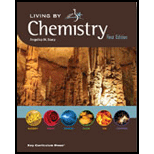
Interpretation:
The reason due to which large amount of energy is required to heat large sample of cold water as compared to small sample needs to be explained.
Concept Introduction :
The heat requiredper unit mass of a substanceto increase the temperature by one degree Celsius, is called specific heat.
Answer to Problem 1E
Large sample has more particles and larger mass thus, it requires more heat.
Explanation of Solution
The greater number of particles present in any substance requires more energy to heat up as compared to the substance having a smaller number of particles.
Because the larger sample has more particles or have larger mass thus, it takes more energy to increase the average kinetic energy of that sample by the same amount as the smaller sample.
Thus, large sample has more particles and larger mass thus, it requires more heat.
Chapter U5 Solutions
Living By Chemistry: First Edition Textbook
Additional Science Textbook Solutions
Anatomy & Physiology (6th Edition)
Human Biology: Concepts and Current Issues (8th Edition)
Chemistry: Structure and Properties (2nd Edition)
Microbiology: An Introduction
Introductory Chemistry (6th Edition)
Organic Chemistry (8th Edition)
- 4 W X D de % F5 人 :0: > F6 1. Fill in the missing information 2. Na2Cr207 H2SO4, H20 OEt H₂O+ SOC2 CI SOCI C DELL OH 480 NEOH F7 B. F8 prt sc home end insert F9 F10 F11 F12 & * + VIX -4.arrow_forwardx 人 3. Fill in the missing information HCN, NaCN A. 3 D. E. H. P H₂O' B. W F. Chaug Br H. NOCHON H20 H* 左 NC. OH (Ph)3P Nech MeOH,HCI OH G. Ph DELL DOWarrow_forwardBe a. Draw an arrow pushing mechanism for the following. OH O HO. W X J DELL OH H₂O HO 8. Walmart wil FS F6 F7 B F8 prt sc home F9 F10 F11 end F12 inse A & * +arrow_forward
- Predict the product of this organic reaction: H+ + HO OH A P+H₂O Specifically, in the drawing area below draw the skeletal ("line") structure of P. If there isn't any P because this reaction won't happen, check the No reaction box under the drawing area. No reaction Click and drag to start drawing a structure. X 5arrow_forwardWhich synthesis of a Grignard reagent would fail to occur as written? Why is the correct answer D? Please explain what is happening. Please include a detailed explanation and a drawing of steps needed to understand the reaction or question.arrow_forwardDraw the structure of the major organic product(s) of the reaction. H3C 1. DIBAH, toluene -CH3 + 2. H3O DIBAH = diisobutylaluminum hydride, [(CH3)2CHCH2]2AIHarrow_forward
- Which of the following is not an intermediate of the reaction below? Why is the correct answer C? Please explain what is happening. Please include a detailed explanation and a drawing of steps needed to understand the reaction or question.arrow_forwardWhich of the following is the product of the reaction between acetone, CH3COCH3 and methyl amine, CH3NH2? Why is the correct answer A? Please explain what is happening. Please include a detailed explanation and a drawing of steps needed to understand the reaction or question.arrow_forwardWhat is the product of the reaction shown below? Why is the correct answer D? Please explain what is happening. Please include a detailed explanation and a drawing of steps needed to understand the reaction or question.arrow_forward
- Write the systematic name of each organic molecule: structure name П O ☐ O ☐ Oarrow_forwardThe 13C NMR signal for which of the indicated carbons will occur at the frequency (most deshielded)? Why is the correct answer E? Please explain what is happening. Please include a detailed explanation needed to understand the or question.arrow_forwardWhich of the following reagents best achieves the reaction shown below? Why is the correct answer B? Please explain what is happening. Please include a detailed explanation and a drawing of steps needed to understand the reaction or question.arrow_forward
 ChemistryChemistryISBN:9781305957404Author:Steven S. Zumdahl, Susan A. Zumdahl, Donald J. DeCostePublisher:Cengage Learning
ChemistryChemistryISBN:9781305957404Author:Steven S. Zumdahl, Susan A. Zumdahl, Donald J. DeCostePublisher:Cengage Learning ChemistryChemistryISBN:9781259911156Author:Raymond Chang Dr., Jason Overby ProfessorPublisher:McGraw-Hill Education
ChemistryChemistryISBN:9781259911156Author:Raymond Chang Dr., Jason Overby ProfessorPublisher:McGraw-Hill Education Principles of Instrumental AnalysisChemistryISBN:9781305577213Author:Douglas A. Skoog, F. James Holler, Stanley R. CrouchPublisher:Cengage Learning
Principles of Instrumental AnalysisChemistryISBN:9781305577213Author:Douglas A. Skoog, F. James Holler, Stanley R. CrouchPublisher:Cengage Learning Organic ChemistryChemistryISBN:9780078021558Author:Janice Gorzynski Smith Dr.Publisher:McGraw-Hill Education
Organic ChemistryChemistryISBN:9780078021558Author:Janice Gorzynski Smith Dr.Publisher:McGraw-Hill Education Chemistry: Principles and ReactionsChemistryISBN:9781305079373Author:William L. Masterton, Cecile N. HurleyPublisher:Cengage Learning
Chemistry: Principles and ReactionsChemistryISBN:9781305079373Author:William L. Masterton, Cecile N. HurleyPublisher:Cengage Learning Elementary Principles of Chemical Processes, Bind...ChemistryISBN:9781118431221Author:Richard M. Felder, Ronald W. Rousseau, Lisa G. BullardPublisher:WILEY
Elementary Principles of Chemical Processes, Bind...ChemistryISBN:9781118431221Author:Richard M. Felder, Ronald W. Rousseau, Lisa G. BullardPublisher:WILEY





